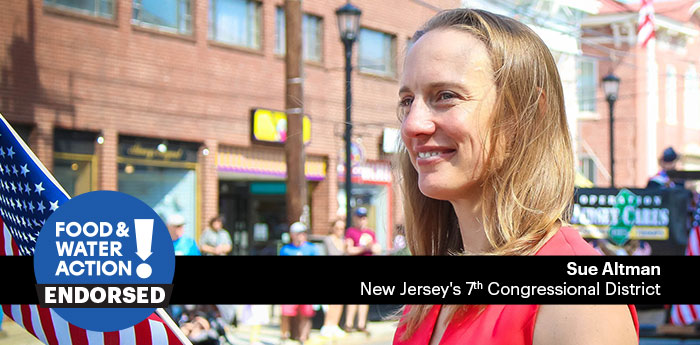FoodNews & Opinion
by Mia DiFelice
In this month’s State of the Union Address, President Joe Biden spoke to what most people in the U.S. are seeing right now — trips to the grocery store are more expensive than ever. The reason? Corporate greed.
“Too many corporations raise their prices to pad their profits, charging you more and more for less and less,” he said.
We couldn’t agree more. The rise in grocery prices have outpaced that of inflation across the economy, as has the growth of corporate profits, some to record highs. In fact, corporate profits rose five times faster than the inflation rate from 2020 to 2022.
What’s more, a recent report from the Biden administration shows how big companies worsened the supply chain problems that raised prices during the pandemic, to their own benefit.
Corporate greed has taken over our economy, leaving families, workers, and farmers struggling just to get by. And this trend has been enabled by lax antitrust enforcement that has let corporate giants get bigger. As they get bigger, their power grows, too.
Luckily, we know just how to tackle this — and so does Biden. Now, in this year’s election, reining in corporations’ bad behavior and countering their power is on the line.
How Corporate Consolidation Leads to Higher Prices
First, let’s take a look at how corporate consolidation works in the American economy. We say markets are “consolidated” when a small handful of very big companies dominate an entire sector. They do this by buying (acquisitions) or joining (mergers) with another company.
Consolidation gives these giant corporations the ability to dictate what goes on in the market, from prices to working conditions. As the president himself said, “Grocers in consolidated markets charge you more because you have nowhere else to shop.” That’s market power.
And corporations are amassing it all across our food system. A few huge players have taken over the markets for dairy, packaged foods, seeds, grocery stores, and more.
Previous administrations have failed to stop this trend. Decades ago, the U.S. took consolidation seriously, but more recent administrations have sided with corporations over families. They failed to stop mergers and acquisitions or the unfair practices that big corporations use to cement their reign. As a result, food prices are soaring, while CEOs and shareholders pocket unprecedented profits.
Consolidation Means Big Wins for Corporations and Big Losses for Everyone Else
Consolidation in our food system affects more than just prices. It also whole local economies. For example, big grocery stores can adopt cost-cutting measures that make it impossible for smaller stores to compete. Small businesses shutter. Then, because the big stores are the only option in town, they can raise prices again — and that’s exactly what they do.
Growing consolidation and market power also gives corporations more leverage to pay lower wages, while those at the top hoard profits for themselves. For instance, Walmart is the biggest grocery chain in the country, and it paid its CEO $25 million in 2023. That’s 933 times the median associate’s wages, which are also below the poverty line for a family of four. At the same time, the grocery juggernaut saw a $163 million increase in profits from 2022 to 2023, for a total of over $13.6 billion.
Moreover, market power enables corporations to get away with harmful, cost-cutting practices, like the poor manure management on factory farms that pollutes communities with waste. Such practices directly harm our climate, environment, and public health.
Market power also helps companies get away with shady tactics, like charging us the same amount for less product. This “shrinkflation” is increasing how much we spend on household essentials like food, soap, and toilet paper.
The bigger and more powerful a corporation is, the more it can duck accountability for its actions — and the more it can influence policymakers by spending millions on lobbying to sway policy in their favor.
Biden is Tackling the Real Reasons Behind High Prices
We have antitrust agencies designed to rein in corporate consolidation. For example, the Federal Trade Commission (FTC) and the Antitrust Division of the Justice Department (DOJ) are supposed to assess proposed mergers and step in if they pose a threat to markets. We also have antitrust laws like the Packers and Stockyards Act, which is supposed to ensure fair and competitive markets in the meat industry.
Yet, antitrust enforcement has fallen — that is, until Biden came into office. The president has taken the kind of action to tackle market power that we haven’t seen for decades.
His 2021 executive order began tackling monopolies in all corners of the economy, especially in food and agriculture. It included 70 actions to foster more competition, such as directing the USDA to create rules to breathe new life into the Packers and Stockyards Act, two of which have been finalized.
This executive order also urged the FTC and DOJ to revise merger guidelines. These detail how the agencies evaluate the risks of mergers and decide whether they’ll challenge them.
And in December of last year, the Biden administration set a record for merger challenges. His FTC and DOJ issued the highest number of challenges since the U.S. began requiring antitrust reviews before mergers, almost five decades ago.
Now, in March, the president announced a new strike force to tackle “unfair and illegal corporate pricing.” These are exactly the kinds of actions we need in order to stand up to corporations and put American families first.
We Can Stop Corporate Greed and Consolidation
In 2024, yet more food consolidation looms on the horizon. In 2022, grocery giant Kroger announced intentions to buy its competitor, Albertsons. They are the second- and fourth-largest grocery stores in the country, respectively.
The $24.6 billion deal would be a gold mine for the companies’ CEOs and owners, and it would cement Kroger’s place near the peak of the grocery store food chain.
But luckily, Biden’s FTC has recognized the danger that such a merger would pose to everyone else. In February, it announced a suit to block the acquisition, which is scheduled for trial in August. This is a welcome step in preventing this disastrous megamerger, and we look forward to more progress in the future.
That’s why Food & Water Action is working hard to get out the vote this year. We’re working to protect aggressive action to rein in rising food costs and break up our consolidated food industry. This kind of policy is essential to combat corporate greed and level the playing field for families, workers, small businesses, and farmers.
At the same time, Food & Water Action will keep working to expose the truth behind rising prices and all the other failures of our food system. We’re debunking corporations’ lies and excuses, and we’re shining light on their tactics to profit at everyone else’s expense. We’re fighting for the fair food system we need to ensure healthy, safe, and affordable food for everyone.
This work is only possible with volunteers and supporters. Learn more about how you can join us!

Time to face it~it’s people or plastics.~We can’t have both.
Become a plastic pollution fighter this Earth~Day and have your gift MATCHED $3-to-$1!



